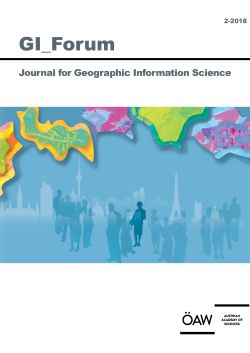 |
 |
Adrijana Car – Thomas Jekel – Josef Strobl – Gerald Griesebner (Eds.)
GI_Forum 2018, Volume 6, Issue 2
Journal for Geographic Information Science
Christina Reithmeier,
Karoline Buschbaum,
Detlef Kanwischer
S. 85 - 96 doi: 10.1553/giscience2018_02_s85
Verlag der Österreichischen Akademie der Wissenschaften doi: 10.1553/giscience2018_02_s85
Abstract:
Social media such as Twitter or Facebook not only create new spaces of interaction and communication, they also influence the way we perceive things and lead to changes in our self-perception and our own worldview. Online data occur in various forms and can contain opinions or expressions of feeling. In this article, we explore the potential of SentiStrength, a tool for sentiment analysis in geographic research. We analyse posts on Twitter containing hashtags for possible constructions of spaces in Ostend, a neighbourhood in Frankfurt, Germany. We collected tweets via the Twitter API and used the SentiStrength online application to conduct our sentiment analysis. In order to evaluate the results, we also classified our data manually for comparison. Through its lexicon-based classification, the tool was able to identify positive and negative associations of Ostend. However, we were also able to demonstrate the limitations of the tool compared to manual analysis. Although it provides a quick and comprehensive overview of sentiments, SentiStrength reaches its limits when other media such as images are involved. Overall, the tool offers a good low-threshold approach for scientists to work with digital data.
sentiment analysis, SentiStrength, Twitter, hashtags, construction of space Published Online:
2018/12/10 08:02:35 Object Identifier:
0xc1aa5576 0x003a1fd1
Rights:https://creativecommons.org/licenses/by-nd/4.0/
GI_Forum publishes high quality original research across the transdisciplinary field of Geographic Information Science (GIScience). The journal provides a platform for dialogue among GI-Scientists and educators, technologists and critical thinkers in an ongoing effort to advance the field and ultimately contribute to the creation of an informed GISociety. Submissions concentrate on innovation in education, science, methodology and technologies in the spatial domain and their role towards a more just, ethical and sustainable science and society. GI_Forum implements the policy of open access publication after a double-blind peer review process through a highly international team of seasoned scientists for quality assurance. Special emphasis is put on actively supporting young scientists through formative reviews of their submissions. Only English language contributions are published.
Starting 2016, GI_Forum publishes two issues a Year.
Joumal Information is available at: GI-Forum
GI_Forum is listed on the Directory of Open Access Journals (DOAJ)
|




 Home
Home Print
Print
 References
References
 Share
Share
